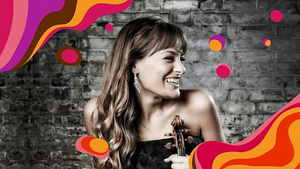Review: BBC PROMS: PLAYING DOUBLES, Royal Albert Hall
Live Proms return to the iconic London enue

![]()
The Royal Albert Hall is usually a lively place between June and September, full of music lovers and classical aficionados. This year, it is an eerie place. The arena is an empty void, watched over by the bust of Henry Wood, Proms creator. The hall is lit with blues, golds, and reds. The boxes around the circle are curtained. The gallery is quiet. The only sign of life across the vast auditorium is the light from the Radio 3 commentary box.
Last night, the Orchestra of the Age of Enlightenment took centre stage with a programme of Baroque celebration. Almost half the pieces were new to the Proms, including a work by Newcastle's 17th-century composer and entrepreneur Charles Avison. The music suited the uncertain times: Vivaldi, Handel, Bach. There were three pieces for two violins; two pieces for two oboes. Plus a short instrumental interlude from an opera, which felt apt as a debate continues around singing in performance.
With a change in performer at a day's notice (violinist Alina Ibragimova withdrawing for personal reasons), three members of the OAE stepped up to duet with the celebrated Nicola Benedetti. Despite the last-minute change, there was a warm camaraderie between the players as each performed. As Benedetti noted in a pre-show interview on the BBC broadcast, "there is nothing safe about Vivaldi", and so it proved as the concert progresses. The choice of music lent itself to small-scale performance. The musicians stood with the requisite distance between them, their director Jonathan Cohen exuding a flawless command of the music and the space. Only the applause of the many was missing.
The OAE were making their fortieth appearance at the Proms. Known for their authenticity of sound, they played instruments of the period, strings and woodwind, a harpsichord and a Baroque theorbo offering a unique glimpse into the music as the composers intended. They played as one, developing their own energy and atmosphere. There was an innate sadness and feeling of loss initially, but this soon evaporated.
The concert opened with Vivaldi's Concerto in D major for two violins. Rudolfo Richter joined with Benedetti to provide a vibrancy of melody and tone in this intimate piece of virtuosity. There was a playful melancholy in the allegro molto, which harked back to the days of stately dances and court intrigue. In contrast, the Concerto in D minor for two violins showcased the rich tones and clear harmonies of the Venetian scene. A stately, reflective piece which has links back to the female music ensemble of Ospedale della Pietà, it arrived here at the Proms for the first time. OAE leader Kati Debretzeni appeared with Benedetti - both proved to be attuned to their surroundings and the general ambience and sound of the OAE, which gave the piece a pleasing richness.
Two pieces by Handel reflected the Germanic influence, although their composer chose London as his adopted home. A brief interlude from the opera Radamisto - Passacaglia, and in the Concerto grosso in B flat major, at the Proms for the first time in nearly 40 years, we found a piece which has a sweetness of building power and comradeship. The oboes at the forefront felt both hopeful and homesick, enigmatic and otherworldly.
Principal oboist Katharina Spreckelsen reappeared with Sarah Humphrys in Vivaldi's Concerto in A minor for two oboes. This was another Proms debut - showcasing the depth and variance in this often-overlooked wind instrument and evoking a world which is somehow simpler in all respects. The oboe proved a beautiful instrument when placed In Focus.
The Avison debut, Concerto Grosso No. 5 in D minor, was a scintillating piece of music - based on one of Domenico Scarlatti's harpsichord concertos, it exhibits a sharp beauty and power in the writing for strings. This was particularly notable with the cello, a darkness of tone cutting through from deep inside the melody. It seems we should know more about this provincial musician whose work is new to the Proms.
Benedetti made a triumphant return opposite OAE violinist Matthew Truscott to perform Bach's Concerto in D minor for two violins, an oft-performed piece at the season, with 60 previous appearances. French noted the piece is ""like an onion with all its intricate layers", and the players brought a new perspective to a perhaps overfamiliar work. An empty hall, a global crisis, yet the ability to play together and connect across the centuries of music.
An encore was inevitable, and welcome: Purcell's Rondo from the Abdelazar Suite, a triumphant old favourite which was just the ticket to close this unusual Prom.
Image credit: Andy Gotts
Reader Reviews
Videos

